Mikhail M. Bakhtin Quotes & Sayings
Enjoy reading and share 30 famous quotes about Mikhail M. Bakhtin with everyone.
Top Mikhail M. Bakhtin Quotes
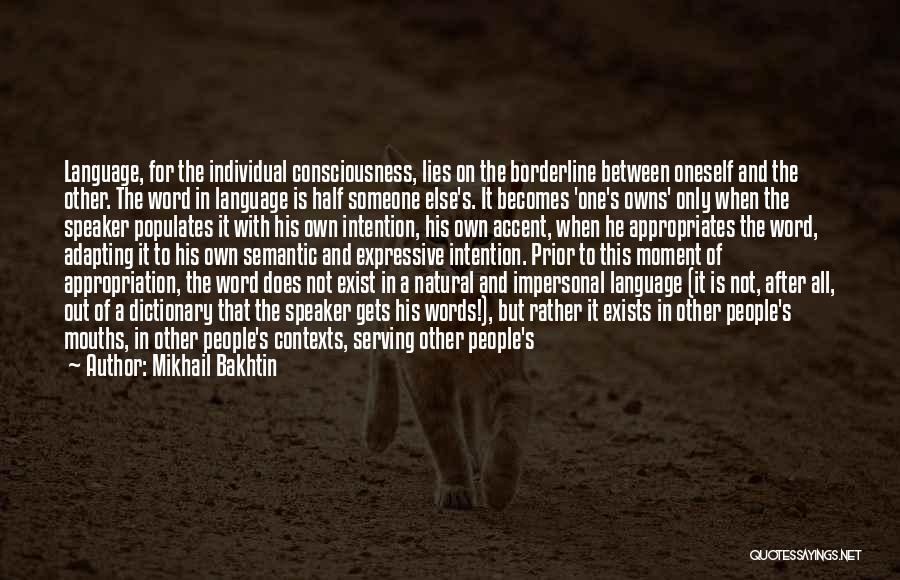
Language, for the individual consciousness, lies on the borderline between oneself and the other. The word in language is half someone else's. It becomes 'one's owns' only when the speaker populates it with his own intention, his own accent, when he appropriates the word, adapting it to his own semantic and expressive intention. Prior to this moment of appropriation, the word does not exist in a natural and impersonal language (it is not, after all, out of a dictionary that the speaker gets his words!), but rather it exists in other people's mouths, in other people's contexts, serving other people's intentions: it is from there that one must take the word, and make it one's own. — Mikhail Bakhtin
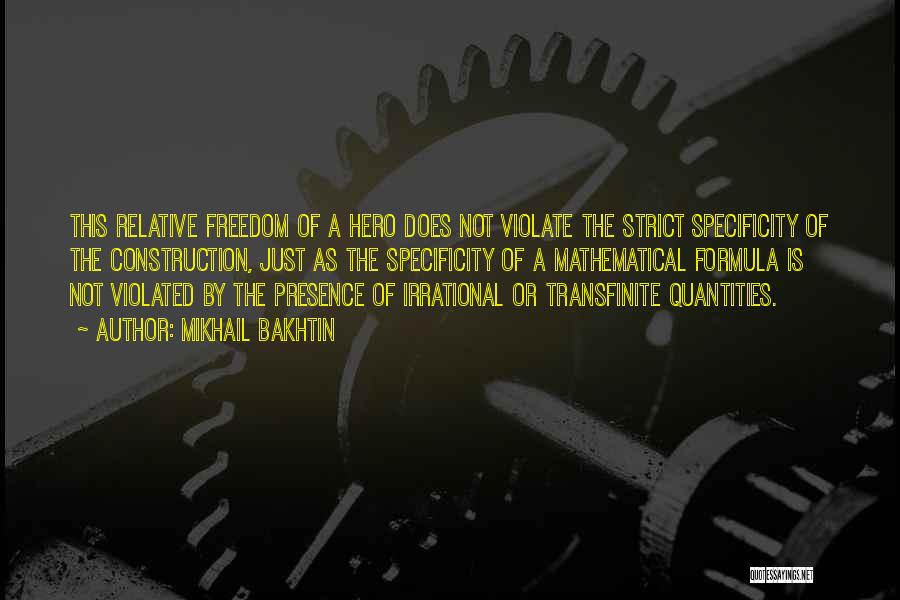
This relative freedom of a hero does not violate the strict specificity of the construction, just as the specificity of a mathematical formula is not violated by the presence of irrational or transfinite quantities. — Mikhail Bakhtin
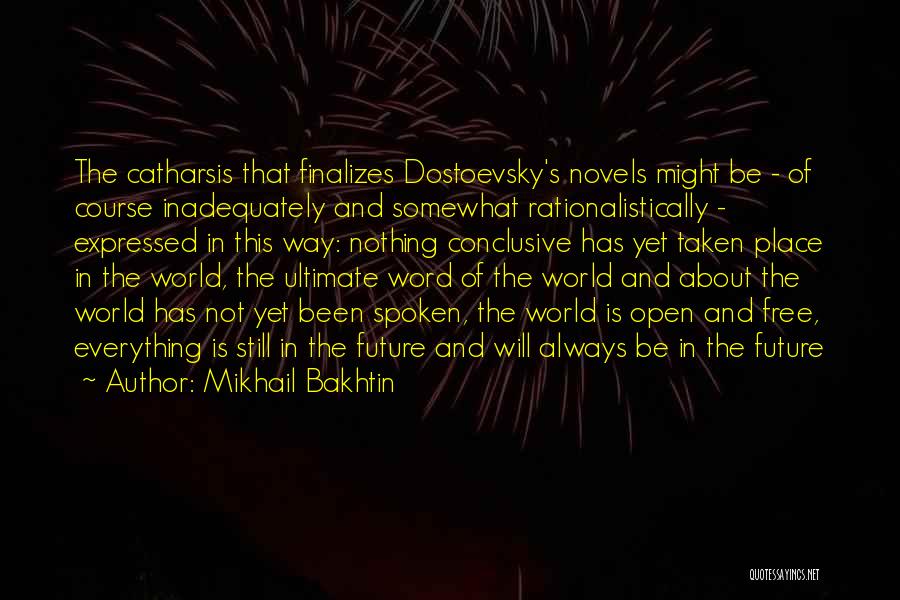
The catharsis that finalizes Dostoevsky's novels might be - of course inadequately and somewhat rationalistically - expressed in this way: nothing conclusive has yet taken place in the world, the ultimate word of the world and about the world has not yet been spoken, the world is open and free, everything is still in the future and will always be in the future — Mikhail Bakhtin
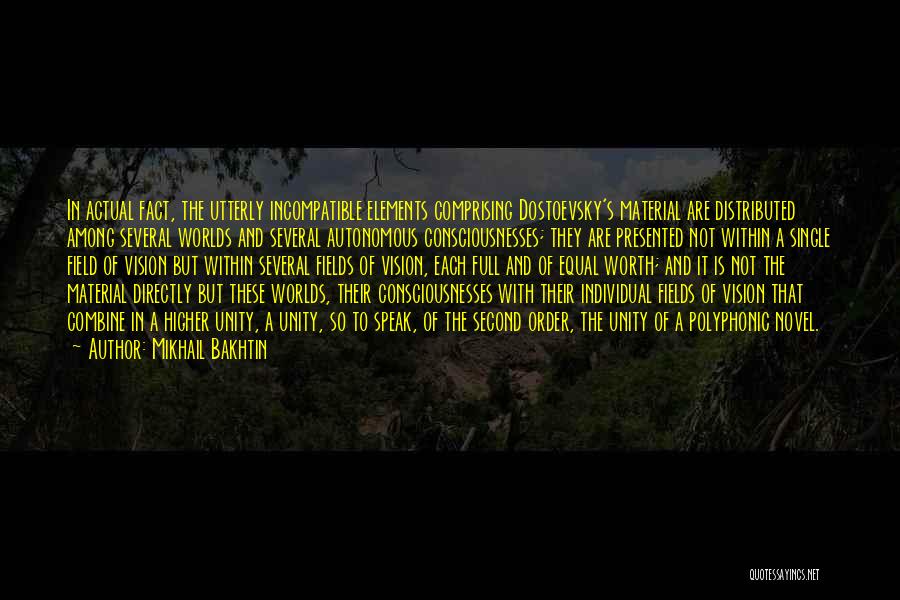
In actual fact, the utterly incompatible elements comprising Dostoevsky's material are distributed among several worlds and several autonomous consciousnesses; they are presented not within a single field of vision but within several fields of vision, each full and of equal worth; and it is not the material directly but these worlds, their consciousnesses with their individual fields of vision that combine in a higher unity, a unity, so to speak, of the second order, the unity of a polyphonic novel. — Mikhail Bakhtin
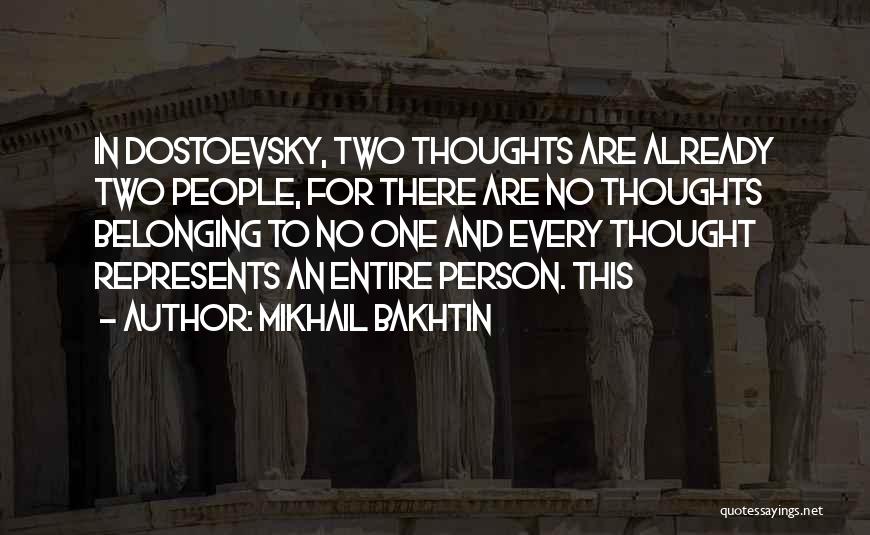
In Dostoevsky, two thoughts are already two people, for there are no thoughts belonging to no one and every thought represents an entire person. This — Mikhail Bakhtin

The themes of metamorphosis (transformation-particularly
human transformation-and identity (particularly human identity) are drawn from the treasury of pre-class world folklore. The folkloric image of man is intimately bound up with transformation and identity. This combination may be seen with particular clarity in the popular folktale )skazkaj. The folktale image of man-throughout the extraordinary variety of folkloric narratives-always orders itself around the motifs of transformation and identity (no matter how varied in its turn the concrete expression of these motifs might be). — Mikhail Bakhtin

A third characteristic is the deliberate multi-styled and heterovoiced nature of all these genres. They reject the stylistic unity (or better, the single-styled nature) of the epic, the tragedy, high rhetoric, the lyric. — Mikhail Bakhtin
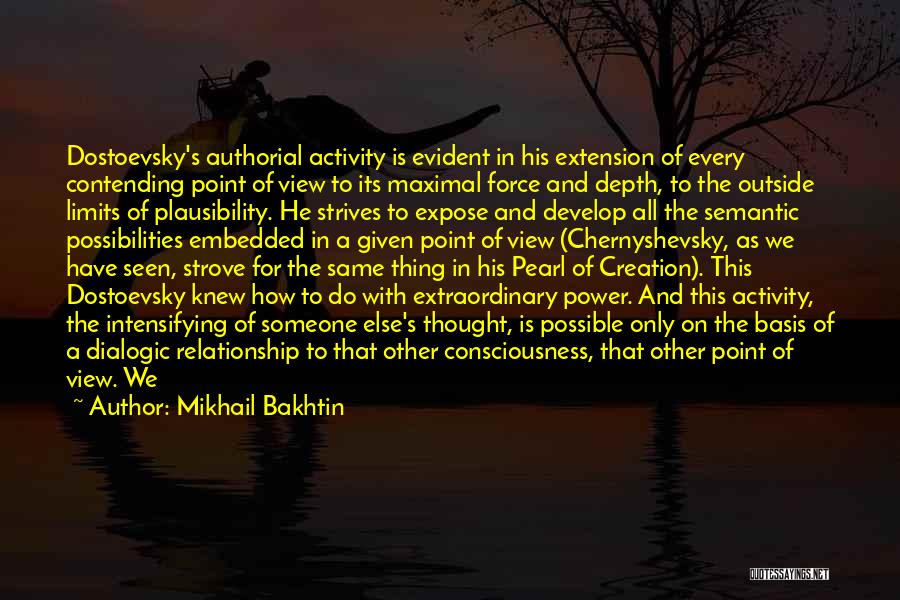
Dostoevsky's authorial activity is evident in his extension of every contending point of view to its maximal force and depth, to the outside limits of plausibility. He strives to expose and develop all the semantic possibilities embedded in a given point of view (Chernyshevsky, as we have seen, strove for the same thing in his Pearl of Creation). This Dostoevsky knew how to do with extraordinary power. And this activity, the intensifying of someone else's thought, is possible only on the basis of a dialogic relationship to that other consciousness, that other point of view. We — Mikhail Bakhtin
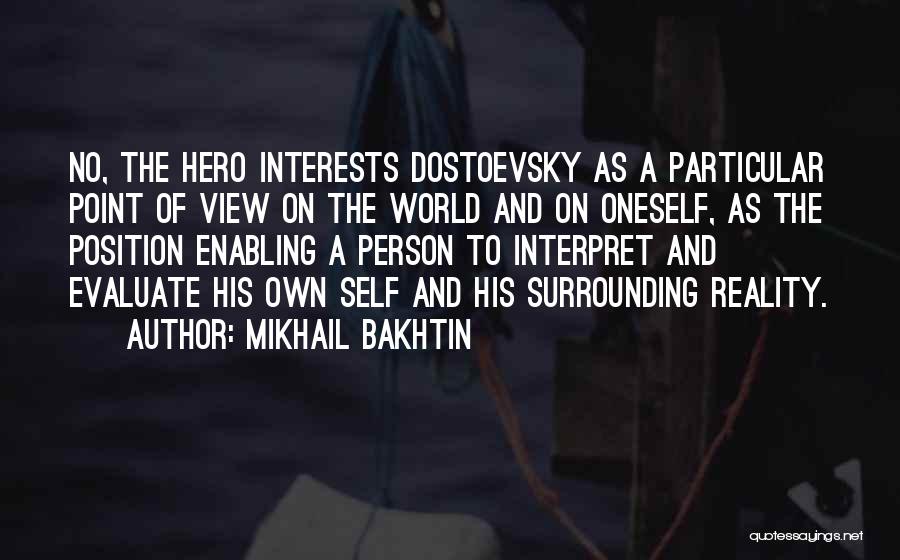
No, the hero interests Dostoevsky as a particular point of view on the world and on oneself, as the position enabling a person to interpret and evaluate his own self and his surrounding reality. — Mikhail Bakhtin
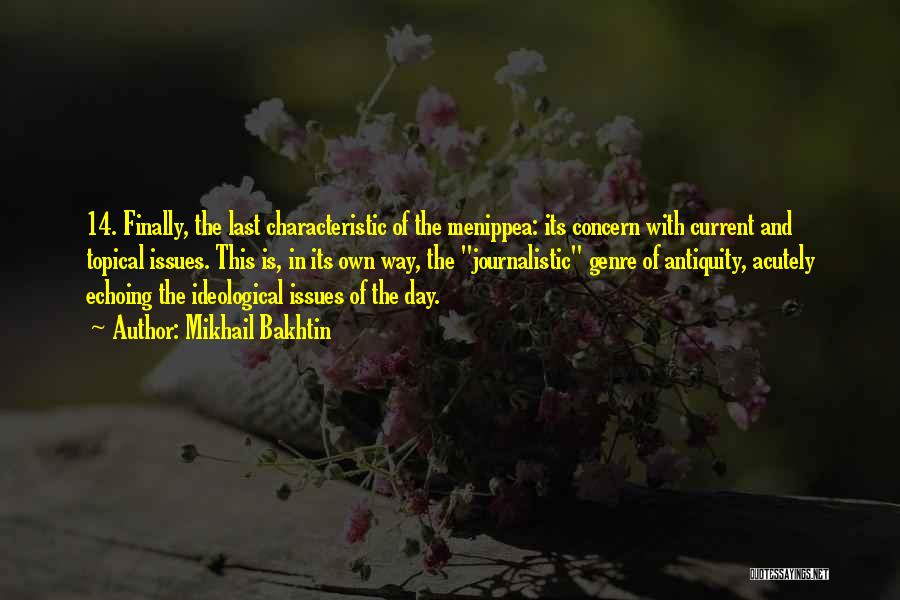
14. Finally, the last characteristic of the menippea: its concern with current and topical issues. This is, in its own way, the "journalistic" genre of antiquity, acutely echoing the ideological issues of the day. — Mikhail Bakhtin
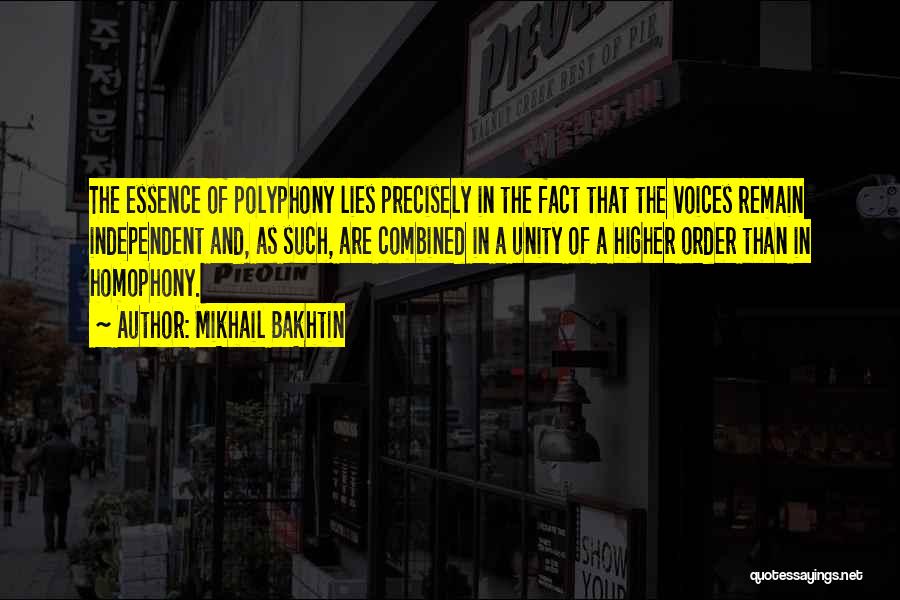
The essence of polyphony lies precisely in the fact that the voices remain independent and, as such, are combined in a unity of a higher order than in homophony. — Mikhail Bakhtin

A newly born genre never supplants or replaces any already existing genres. Each new genre merely supplements the old ones, merely widens the circle of already existing genres. For every genre has its own predominant sphere of existence, in which it is irreplaceable. Thus the appearance of the polyphonic novel does not nullify or in any way restrict the further productive development of monologic forms of the novel (biographical, historical, the novel of everyday life, the novel-epic, etc.), for there will always continue to exist and expand those spheres of existence, of man and nature, which require precisely objectified and finalizing, that is monological, forms of artistic cognition. But again we repeat: the thinking human consciousness and the dialogic sphere in which this consciousness exists, in all its depth and specificity, cannot be reached through a monologic artistic approach. — Mikhail Bakhtin
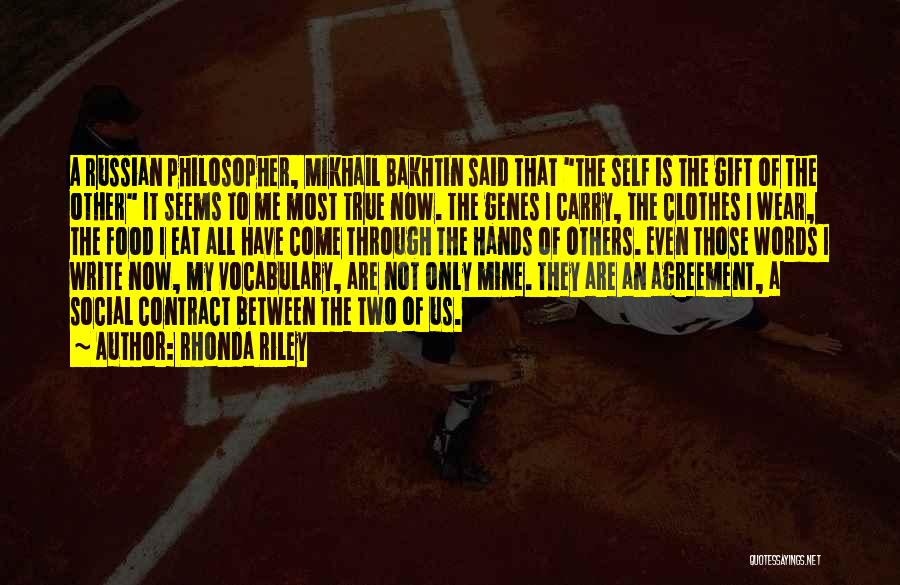
A Russian philosopher, Mikhail Bakhtin said that "the self is the gift of the other" It seems to me most true now. The genes I carry, the clothes I wear, the food I eat all have come through the hands of others. Even those words I write now, my vocabulary, are not only mine. They are an agreement, a social contract between the two of us. — Rhonda Riley

The primary carnivalistic act is the mock crowning and subsequent decrowning of the carnival king. — Mikhail Bakhtin
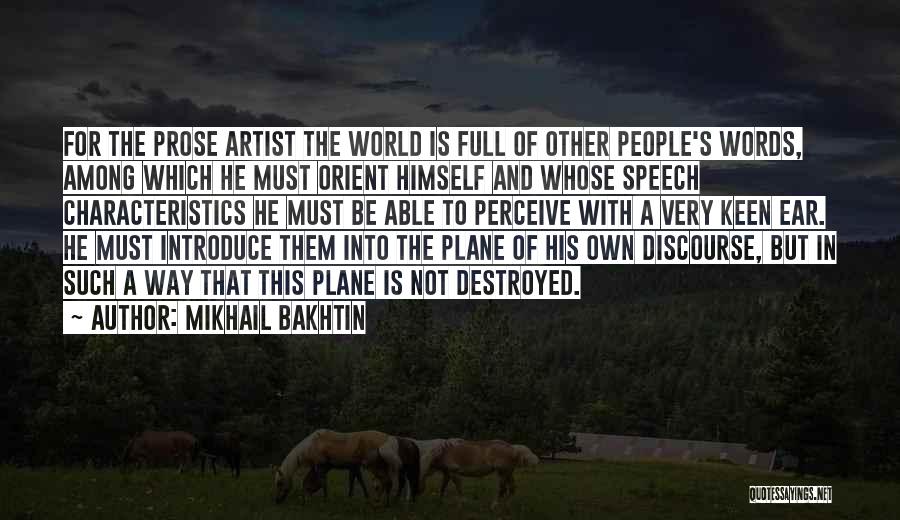
For the prose artist the world is full of other people's words, among which he must orient himself and whose speech characteristics he must be able to perceive with a very keen ear. He must introduce them into the plane of his own discourse, but in such a way that this plane is not destroyed. — Mikhail Bakhtin
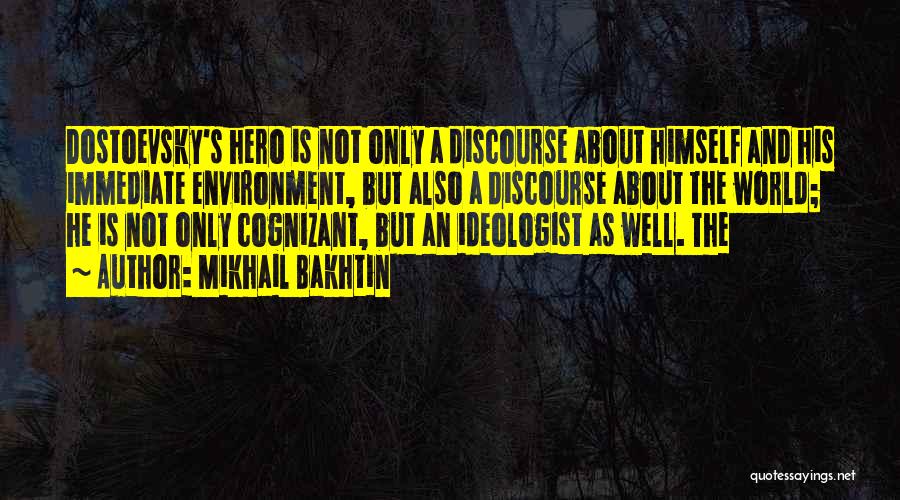
Dostoevsky's hero is not only a discourse about himself and his immediate environment, but also a discourse about the world; he is not only cognizant, but an ideologist as well. The — Mikhail Bakhtin
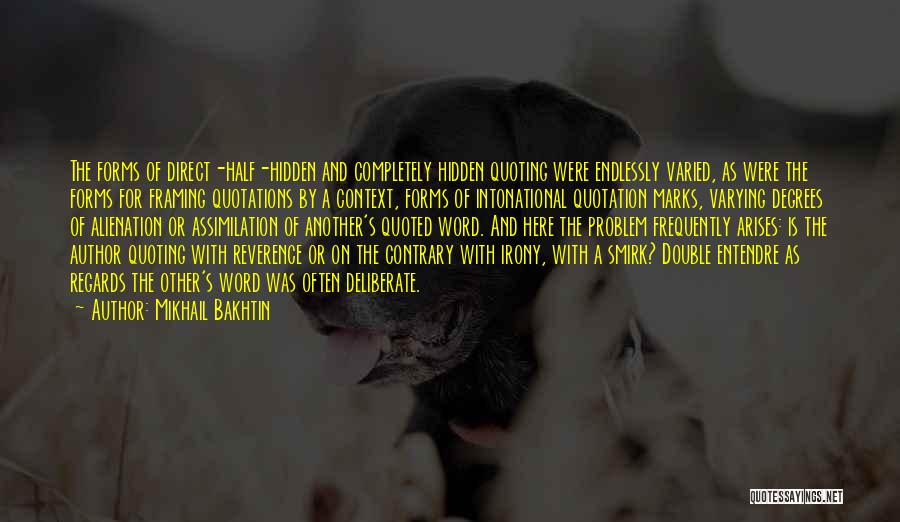
The forms of direct-half-hidden and completely hidden quoting were endlessly varied, as were the forms for framing quotations by a context, forms of intonational quotation marks, varying degrees of alienation or assimilation of another's quoted word. And here the problem frequently arises: is the author quoting with reverence or on the contrary with irony, with a smirk? Double entendre as regards the other's word was often deliberate. — Mikhail Bakhtin
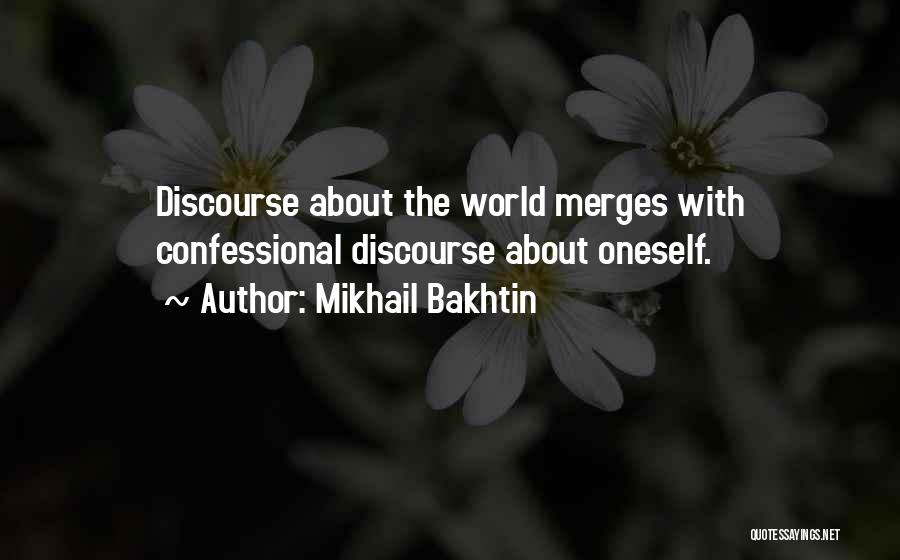
Discourse about the world merges with confessional discourse about oneself. — Mikhail Bakhtin

Carnival laughter does not permit a single one of these aspects of change to be absolutized or to congeal in one-sided seriousness. — Mikhail Bakhtin
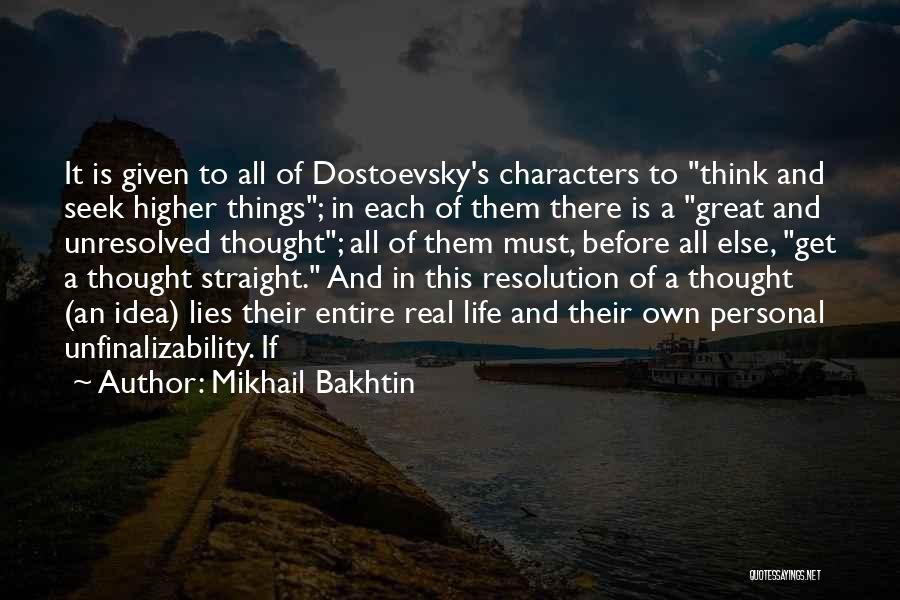
It is given to all of Dostoevsky's characters to "think and seek higher things"; in each of them there is a "great and unresolved thought"; all of them must, before all else, "get a thought straight." And in this resolution of a thought (an idea) lies their entire real life and their own personal unfinalizability. If — Mikhail Bakhtin
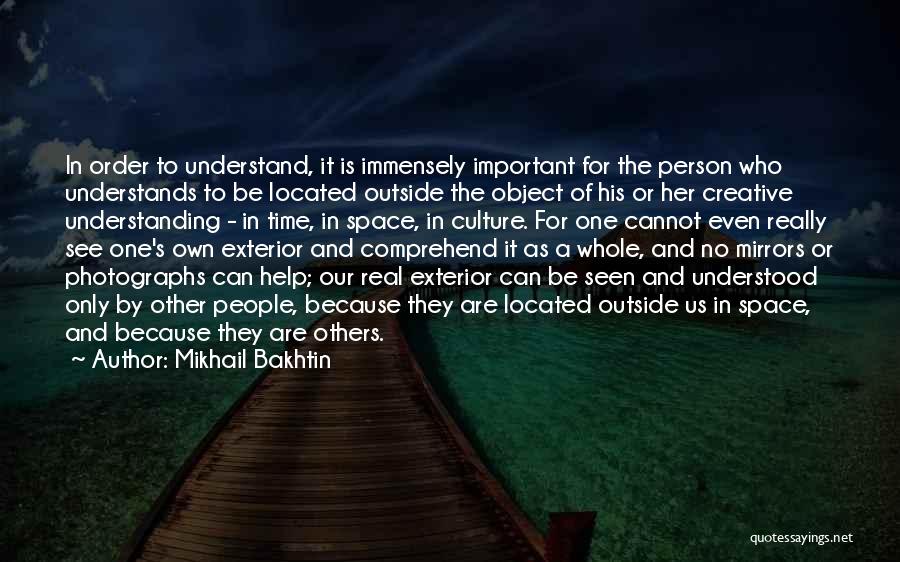
In order to understand, it is immensely important for the person who understands to be located outside the object of his or her creative understanding - in time, in space, in culture. For one cannot even really see one's own exterior and comprehend it as a whole, and no mirrors or photographs can help; our real exterior can be seen and understood only by other people, because they are located outside us in space, and because they are others. — Mikhail Bakhtin
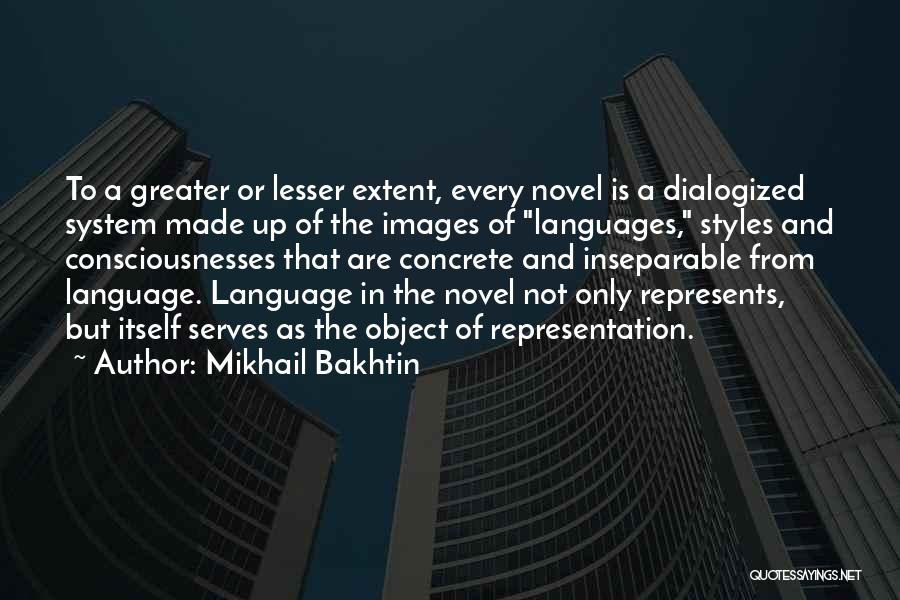
To a greater or lesser extent, every novel is a dialogized system made up of the images of "languages," styles and consciousnesses that are concrete and inseparable from language. Language in the novel not only represents, but itself serves as the object of representation. — Mikhail Bakhtin

I find three basic characteristics that fundamentally distinguish the novel in principle from other genres: (i) its stylistic three-dimensionality, which is linked with the multi-languaged consciousness realized in the novel; (2) the radical change it effects in the temporal coordinates of the literary image; (3) the new zone opened by the novel for structuring literary images, namely, the zone of maximal contact with the present (with contemporary reality) in all its openendedness.
These three characteristics of the novel are all organically interrelated and have all been powerfully affected by a very specific rupture in the history of European civilization: its emergence from a socially isolated and culturally deaf semipatriarchal society, and its entrance into international and interlingual contacts and relationships. — Mikhail Bakhtin
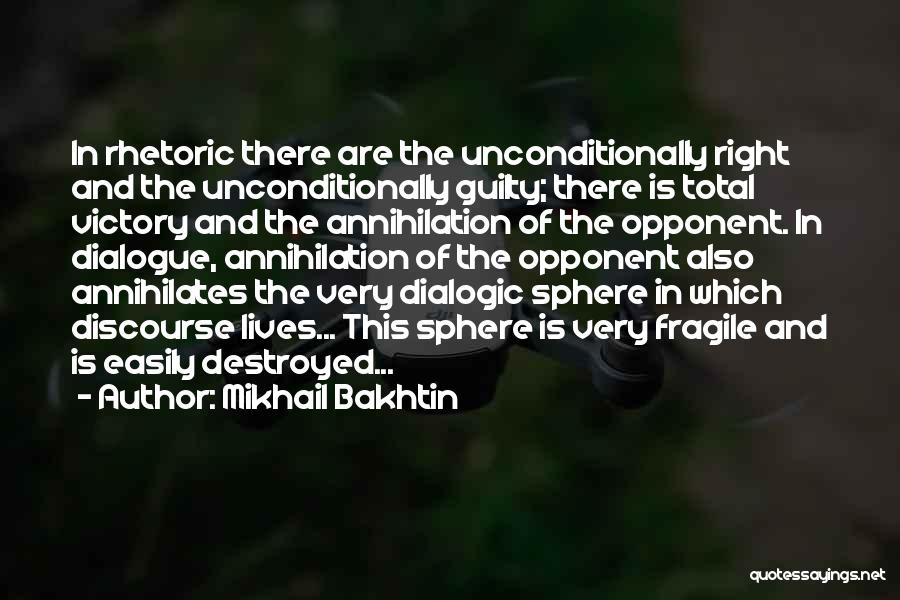
In rhetoric there are the unconditionally right and the unconditionally guilty; there is total victory and the annihilation of the opponent. In dialogue, annihilation of the opponent also annihilates the very dialogic sphere in which discourse lives... This sphere is very fragile and is easily destroyed... — Mikhail Bakhtin

In poetry, even discourse about doubts must be cast in a discourse that cannot be doubted. — Mikhail Bakhtin

There is no such thing as a "general language," a language that is spoken by a general voice, that may be divorced from a specific saying, which is charged with particular overtones. Language, when it means, is somebody talking to somebody else, even when that someone else is one's own inner addressee. — Mikhail Bakhtin
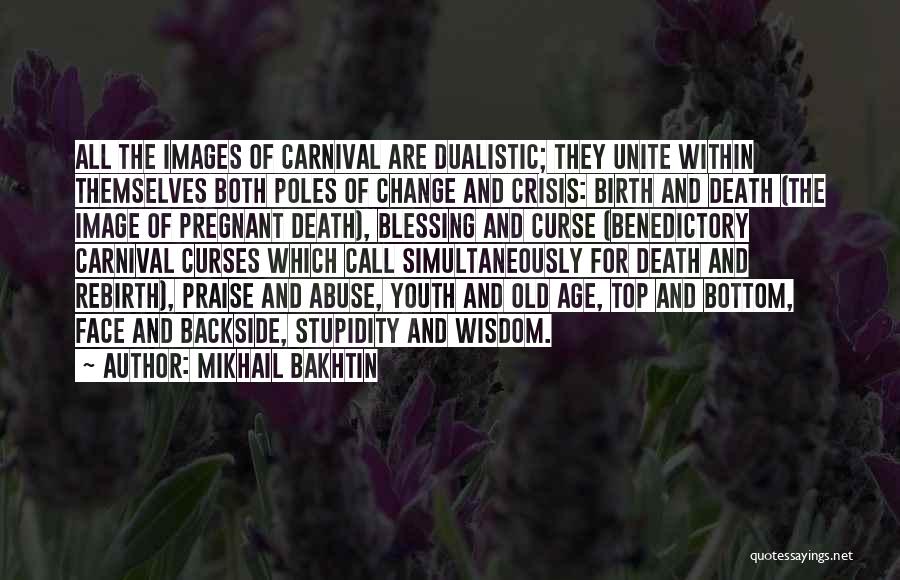
All the images of carnival are dualistic; they unite within themselves both poles of change and crisis: birth and death (the image of pregnant death), blessing and curse (benedictory carnival curses which call simultaneously for death and rebirth), praise and abuse, youth and old age, top and bottom, face and backside, stupidity and wisdom. — Mikhail Bakhtin
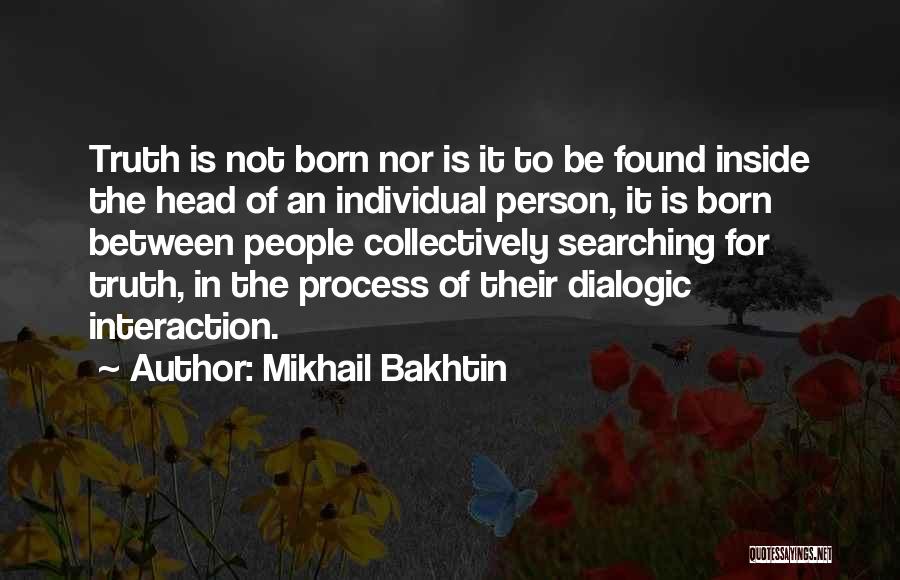
Truth is not born nor is it to be found inside the head of an individual person, it is born between people collectively searching for truth, in the process of their dialogic interaction. — Mikhail Bakhtin
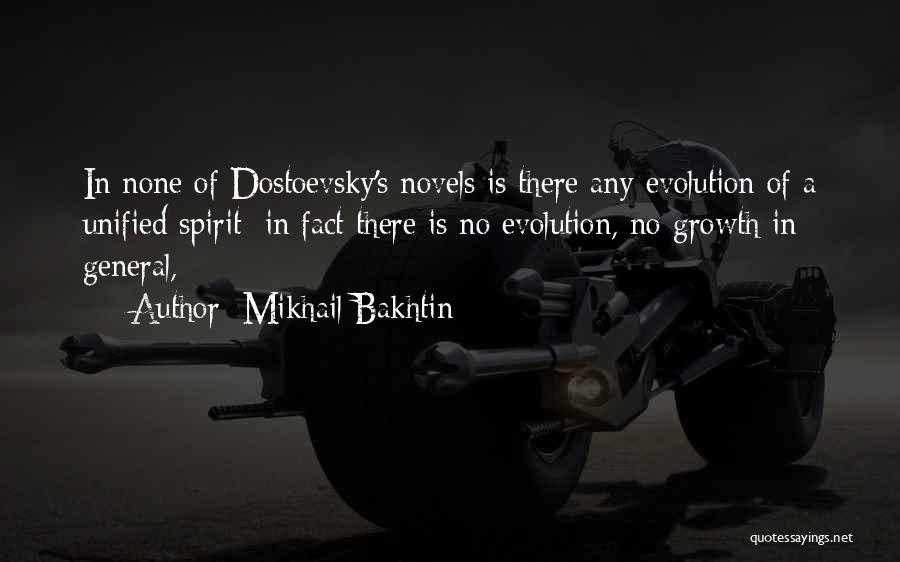
In none of Dostoevsky's novels is there any evolution of a unified spirit; in fact there is no evolution, no growth in general, — Mikhail Bakhtin
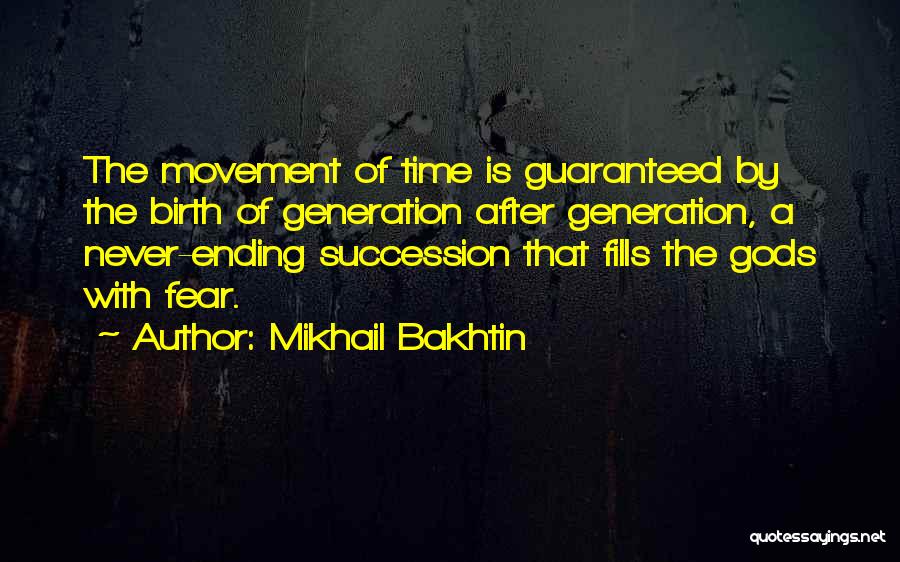
The movement of time is guaranteed by the birth of generation after generation, a never-ending succession that fills the gods with fear. — Mikhail Bakhtin





